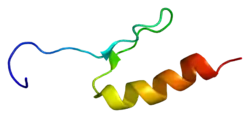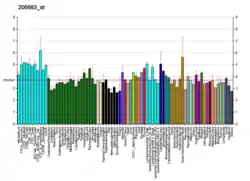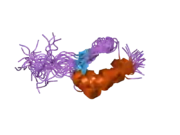Sp4 transcription factor
Transcription factor Sp4 is a protein that in humans is encoded by the SP4 gene.[5][6]
References
- GRCh38: Ensembl release 89: ENSG00000105866 - Ensembl, May 2017
- GRCm38: Ensembl release 89: ENSMUSG00000025323 - Ensembl, May 2017
- "Human PubMed Reference:". National Center for Biotechnology Information, U.S. National Library of Medicine.
- "Mouse PubMed Reference:". National Center for Biotechnology Information, U.S. National Library of Medicine.
- Hagen G, Müller S, Beato M, Suske G (November 1992). "Cloning by recognition site screening of two novel GT box binding proteins: a family of Sp1 related genes". Nucleic Acids Research. 20 (21): 5519–25. doi:10.1093/nar/20.21.5519. PMC 334381. PMID 1454515.
- "Entrez Gene: SP4 Sp4 transcription factor".
- Rotheneder H, Geymayer S, Haidweger E (November 1999). "Transcription factors of the Sp1 family: interaction with E2F and regulation of the murine thymidine kinase promoter". Journal of Molecular Biology. 293 (5): 1005–15. doi:10.1006/jmbi.1999.3213. PMID 10547281.
Further reading
- Suske G (October 1999). "The Sp-family of transcription factors". Gene. 238 (2): 291–300. doi:10.1016/S0378-1119(99)00357-1. PMID 10570957.
- Hagen G, Dennig J, Preiss A, Beato M, Suske G (October 1995). "Functional analyses of the transcription factor Sp4 reveal properties distinct from Sp1 and Sp3". The Journal of Biological Chemistry. 270 (42): 24989–94. doi:10.1074/jbc.270.42.24989. PMID 7559627.
- Kalff-Suske M, Kunz J, Grzeschik KH, Suske G (April 1995). "Human Sp4 transcription factor gene (SP4) maps to chromosome 7p15". Genomics. 26 (3): 631–3. doi:10.1016/0888-7543(95)80191-N. PMID 7607696.
- Majello B, De Luca P, Hagen G, Suske G, Lania L (November 1994). "Different members of the Sp1 multigene family exert opposite transcriptional regulation of the long terminal repeat of HIV-1". Nucleic Acids Research. 22 (23): 4914–21. doi:10.1093/nar/22.23.4914. PMC 523756. PMID 7800480.
- Rotheneder H, Geymayer S, Haidweger E (November 1999). "Transcription factors of the Sp1 family: interaction with E2F and regulation of the murine thymidine kinase promoter". Journal of Molecular Biology. 293 (5): 1005–15. doi:10.1006/jmbi.1999.3213. PMID 10547281.
- Nguyên-Trân VT, Kubalak SW, Minamisawa S, Fiset C, Wollert KC, Brown AB, Ruiz-Lozano P, Barrere-Lemaire S, Kondo R, Norman LW, Gourdie RG, Rahme MM, Feld GK, Clark RB, Giles WR, Chien KR (September 2000). "A novel genetic pathway for sudden cardiac death via defects in the transition between ventricular and conduction system cell lineages". Cell. 102 (5): 671–82. doi:10.1016/S0092-8674(00)00089-1. PMID 11007485. S2CID 3017990.
- Lerner LE, Gribanova YE, Ji M, Knox BE, Farber DB (September 2001). "Nrl and Sp nuclear proteins mediate transcription of rod-specific cGMP-phosphodiesterase beta-subunit gene: involvement of multiple response elements". The Journal of Biological Chemistry. 276 (37): 34999–5007. doi:10.1074/jbc.M103301200. PMID 11438531.
- Lerner LE, Gribanova YE, Whitaker L, Knox BE, Farber DB (July 2002). "The rod cGMP-phosphodiesterase beta-subunit promoter is a specific target for Sp4 and is not activated by other Sp proteins or CRX". The Journal of Biological Chemistry. 277 (29): 25877–83. doi:10.1074/jbc.M201407200. PMID 11943774.
- Lee DK, Suh D, Edenberg HJ, Hur MW (July 2002). "POZ domain transcription factor, FBI-1, represses transcription of ADH5/FDH by interacting with the zinc finger and interfering with DNA binding activity of Sp1". The Journal of Biological Chemistry. 277 (30): 26761–8. doi:10.1074/jbc.M202078200. PMID 12004059.
- Wistow G, Bernstein SL, Wyatt MK, Ray S, Behal A, Touchman JW, Bouffard G, Smith D, Peterson K (June 2002). "Expressed sequence tag analysis of human retina for the NEIBank Project: retbindin, an abundant, novel retinal cDNA and alternative splicing of other retina-preferred gene transcripts". Molecular Vision. 8: 196–204. PMID 12107411.
- Davis W, Chen ZJ, Ile KE, Tew KD (February 2003). "Reciprocal regulation of expression of the human adenosine 5'-triphosphate binding cassette, sub-family A, transporter 2 (ABCA2) promoter by the early growth response-1 (EGR-1) and Sp-family transcription factors". Nucleic Acids Research. 31 (3): 1097–107. doi:10.1093/nar/gkg192. PMC 149212. PMID 12560508.
- Hong J, Samudio I, Liu S, Abdelrahim M, Safe S (December 2004). "Peroxisome proliferator-activated receptor gamma-dependent activation of p21 in Panc-28 pancreatic cancer cells involves Sp1 and Sp4 proteins". Endocrinology. 145 (12): 5774–85. doi:10.1210/en.2004-0686. PMID 15345676.
- Phillips RJ, Tyson-Capper Née Pollard AJ, Bailey J, Robson SC, Europe-Finner GN (June 2005). "Regulation of expression of the chorionic gonadotropin/luteinizing hormone receptor gene in the human myometrium: involvement of specificity protein-1 (Sp1), Sp3, Sp4, Sp-like proteins, and histone deacetylases". The Journal of Clinical Endocrinology and Metabolism. 90 (6): 3479–90. doi:10.1210/jc.2004-1962. PMID 15788387.
- Higgins KJ, Liu S, Abdelrahim M, Yoon K, Vanderlaag K, Porter W, Metz RP, Safe S (July 2006). "Vascular endothelial growth factor receptor-2 expression is induced by 17beta-estradiol in ZR-75 breast cancer cells by estrogen receptor alpha/Sp proteins". Endocrinology. 147 (7): 3285–95. doi:10.1210/en.2006-0081. PMID 16574784.
- Gao YQ, Danciger M, Ozgul RK, Gribanova Y, Jacobson S, Farber DB (2007). "Association of the Asn306Ser variant of the SP4 transcription factor and an intronic variant in the beta-subunit of transducin with digenic disease". Molecular Vision. 13: 287–92. PMC 2633482. PMID 17356515.
External links
- Sp4+Transcription+Factor at the US National Library of Medicine Medical Subject Headings (MeSH)
This article is issued from Wikipedia. The text is licensed under Creative Commons - Attribution - Sharealike. Additional terms may apply for the media files.






